William Jefferson (Bill) Clinton (born 1946) won the Democratic nomination for the presidency in 1992 and then defeated incumbent George Bush to become the 42nd president of the United States. He was re-elected to a second term in 1996 William Jefferson (Bill) Clinton was born in Hope, Arkansas, on August 19, 1946. He was a fifth-generation Arkansan. His mother, Virginia Kelly, named him William Jefferson Blyth, IV, after his father, who had been killed in a freak accident several months before Bill's birth. When Bill was four years old his mother left him with her parents, Hardey and Mattie Hawkins, while she trained as a nurse-anesthesiologist. His grandparents ran a small store in a predominantly African American neighborhood and, despite the racist practices of the South in the early 1950s, Bill's grandparents taught him that segregation was wrong. After his mother's marriage to Roger Clinton when Bill was eight, the family moved to Hot Springs, Arkansas. They lived outside of the town in a house that had no indoor plumbing, which was not unusual for rural Arkansas in the late 1950s and early 1960s. Though Bill changed his last name to Clinton when he was 15 in an expression of family solidarity, the Clinton household was a troubled one. Roger Clinton was an alcoholic, and the family was frequently disrupted by incidents of domestic violence. At the age of 15 Bill made it clear to his stepfather that he would protect his mother and half brother, Roger, Jr., from any further assaults. Clinton considered several careers as a child. At one point he wanted to be a musician (a saxophonist), and at another he wanted to be a doctor, but in 1963, as part of a delegation of the American Legion Boys' Nation, he met then-President John F. Kennedy. As a result of that meeting Clinton decided that he wanted a career in politics. Education of a Future President He entered college at Georgetown University in 1964. As a college student Clinton was committed to the movement against the Vietnam War, as well as to the civil rights struggle. In 1966 he worked as a summer intern for Arkansas Senator J. William Fulbright, who was at that time the leader of antiwar sentiment in the U.S. Senate. He was still a college student in Washington, D.C., when Martin Luther King, Jr., was killed, and he and a friend used Clinton's car to deliver food and medical supplies to besieged neighborhoods during the unrest that followed King's assassination. Bill Clinton graduated from Georgetown University in 1968 with a B.S. in International Affairs. It was already clear to those who knew him that he was a natural politician. Clinton was awarded a Rhodes scholarship and spent the next two years as a postgraduate student at Oxford University. It was in 1969, while at Oxford, that Clinton wrote a letter to an army colonel in the University of Arkansas ROTC program concerning his draft eligibility and his opposition to the war in Vietnam. In his letter he expressed concern about his position both in terms of the draft and in terms of his later "political viability." At the age of 23 Clinton was already concerned with his electability. In 1970 Clinton entered law school at Yale University. In his first year at Yale Clinton served as a campaign coordinator for Joe Duffy, an antiwar candidate for the U.S. Senate from Connecticut. While still a law student, Clinton worked with the writer Taylor Branch as campaign coordinator in Texas for presidential candidate George McGovern. At Yale Clinton met Hillary Rodham, a fellow law student. After graduation Clinton and Rodham were offered jobs on the staff of the House of Representatives committee that was considering the impeachment of Richard Nixon. Clinton chose to return to Arkansas while Hillary Rodham went to work as a member of the House staff. Clinton went into private practice in Fayetteville, the center of Arkansas politics, and also began teaching at the University of Arkansas Law School. A Political Career in Arkansas In 1974 he ran for Congress against John Paul Hammerschmidt, who was a strong Nixon supporter. He lost the election, but it was a very close vote. In a heavily Republican district, running as the incumbent, Hammerschmidt got only 51.5 percent of the vote. Hillary Rodham moved to Fayetteville in 1974 and also began teaching at the University of Arkansas Law School. On October 11, 1975, Bill Clinton and Hillary Rodham were married. In 1976 the Clintons moved to Little Rock when Bill was elected attorney general of the State of Arkansas, an office he held from 1977 to 1979. In 1978 Bill Clinton ran for the office of governor of Arkansas. He was elected, and was the youngest-ever governor of Arkansas; in fact, he was the youngest person to be elected governor of any state since Harold E. Stassen was elected in 1938 at the age of 31. In his first term in office Clinton attempted to make numerous changes, many of which were extremely unpopular, including an attempt to raise automobile licensing fees. On February 27, 1980, Bill and Hillary Clinton had a daughter they named Chelsea Victoria. In November of that same year Ronald Reagan won a landslide victory against Jimmy Carter, and Bill Clinton lost his bid for reelection as governor of Arkansas to Republican candidate Frank White. Clinton was a strong Carter supporter, which accounted for some of his difficulties, but Clinton recognized that many of his own policies had cost him reelection. When Clinton campaigned for election in 1982 against White, he explained he had learned the price for hubris and the importance of adaptability and compromise. He was elected with 55 percent of the vote. Clinton served as governor of Arkansas until 1992. He was considered to be an activist, pushing for school reform and for health care and welfare reform with mixed results. He continued in these years to be active in Democratic national politics. Increasingly, Clinton attracted interest as a new voice in post-segregation southern politics. In 1988 Clinton came to national prominence at the Democratic convention when he gave a lengthy speech nominating Massachusetts Governor Michael Dukakis as the party's presidential candidate. Clinton's speech was considered to be excessively long and was not well received. The audience, in fact, began to shout, "Get off, get off." In spite of this unsuccessful debut, Clinton continued to be active in national politics. In 1991 he was voted most effective governor by his peers. That same year he was chosen as chair of the Democratic Leadership Conference. Along with such other southerners as Albert Gore of Tennessee, he worked to shift control of the party away from the northeastern liberal wing and to reshape a new party constituency. In October of 1991 Clinton announced that he was entering the 1992 race for president. 1992 Campaign and Election Clinton had a lot of competition for the Democratic nomination, and many of those candidates claimed to be the alternative who offered a change from the party's past and a chance to beat the incumbent president, George Bush. Even before the New Hampshire primary in early 1992 Clinton had suffered many embarrassments and difficulties. He came from a state that was small and was regarded by many as unsophisticated and economically underdeveloped. Critics felt he had no experience on the federal level and no understanding of foreign policy. Clinton in turn insisted that his strengths lay in the fact that he was not connected to a Washington power base and therefore had a fresh perspective to bring to government. Clinton's campaign was also plagued by charges of personal scandal that included allegations of sexual liaisons with women other than his wife and questions about his draft status during the Vietnam War. Clinton remained in the race, however, slowly gaining momentum until the 1992 Democratic convention, where he became his party's nominee. He selected Senator Albert Gore as his running mate. Clinton focused his campaign on economic issues, especially stressing his understanding of the plight of the unemployed and the underemployed as well as general concern over access to health care. In November 1992 Clinton was elected president, defeating Republican incumbent George Bush and third-party candidate Ross Perot. Once in office Clinton addressed economic issues as interest rates and unemployment began to drop. He also appointed Hillary Rodham Clinton as the head of a task force mandated to explore possibilities for large-scale health care reform. Helped by a Democratic majority in both the Senate and the House of Representatives, Clinton was able to have enacted most of his proposals for the "change" issue that keyed his campaign. Probably the most enduring of the passed legislation was the 1993 North American Free Trade Agreement (NAFTA) making a single trading bloc of the United States, Canada, and Mexico. As the end of Clinton's term approached a new scandal threatened the President's credibility. The scandal was termed Whitewater for the suspicious Arkansas land deal in which Bill and Hillary Clinton were involved. In 1996 Clinton was re-elected to a second term as the United States President. He won the election by a landslide, defeating Bob Dole with 49 percent of the popular vote and 379 electoral votes. Bill Clinton continues campaigning for the issues in which he believes. He remains the nation's youngest President since John F. Kennedy in 1960. Clinton has left a mark on not only the nation, but on the world as well. |
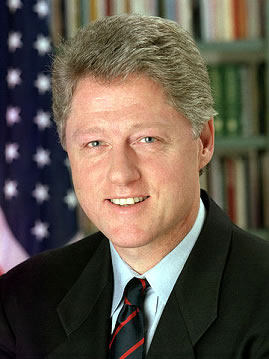 |
Bill Clinton Born: August 19, 1946 (age 65) Hope, Arkansas, U.S.
|
|
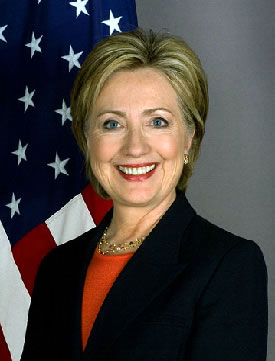 |
|
First lady: Hillary Rodham Clinton |
|
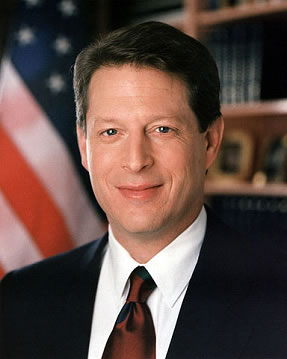 |
|
Vice-president: Albert Arnold «Al» Gore Jr. |
|
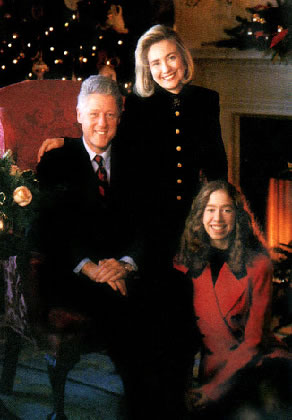 |
|
| Clinton family in White House | |
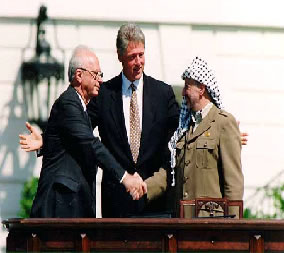 |
|
| Clinton, Yitzhak Rabin and Yasser Arafat during the Oslo Accords on 13 September 1993 | |
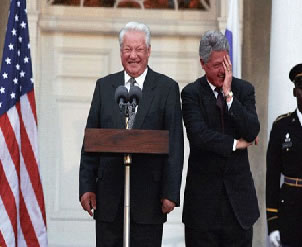 |
|
| Clinton and Boris Yeltsin share a laugh in October 1995 | |
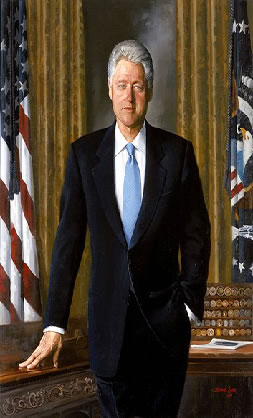 |
|
| Bill Clinton's official White House portrait |